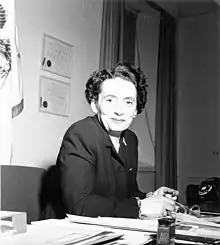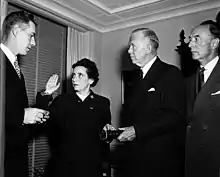Anna M. Rosenberg
Anna Marie Rosenberg (née Lederer; July 19, 1901 – May 9, 1983), later Anna Rosenberg Hoffman, was an American public official and businesswoman.[1]
Anna M. Rosenberg | |
|---|---|
 Rosenberg in 1951 | |
| Born | Anna Marie Lederer July 19, 1901 |
| Died | May 9, 1983 (aged 80) |
| Occupation | Assistant Secretary of Defense |
| Spouse(s) | Julius Rosenberg
(m. 1919; div. 1962)Paul G. Hoffman |
Background
Anna Lederer was born on July 19, 1901, in Budapest, the child of Albert Lederer and Charlotte (Bacskai) Lederer.[2] She had at least one sibling, a sister Clare Lederer von Arnold. In 1912, she immigrated with her family to the United States.[2] She went to school at Wadleigh High School.[1]
Career
During World War I, she served as a student nurse and sold Liberty Bonds.[1]
In 1934, Nathan Straus, regional director for the National Recovery Act, made her assistant. In 1936, she succeeded him as regional director. In 1937, she became regional director of the Social Security Board through 1943.[1]
In 1941, she served in the Office of Defense Health and Welfare Services through 1942. In 1942, she served as regional director of the War Manpower Commission through 1945. Concurrently, 1941–1945, she consulted to the Retraining and Reemployment Administration. In 1944, when U.S. President Franklin Delano Roosevelt sent her to Europe to report on the needs of American soldiers after their demobilization, she recommended education and supported the G.I. Bill of Rights.[1]
After the war, she ran a consulting business, with customers that included large businesses and public figures. In late 1950, she was nominated for Assistant Secretary of Defense for Manpower and Personnel. Joseph McCarthy and his staff launched an all-out campaign to oppose her nomination due to alleged connections to the Communist Party, but she was recommended by the Senate Armed Services Committee. In spite of opposition, on November 15, 1950 she was named Assistant Secretary of Defense, a post she held until January 1953.

When she was sworn in as the assistant secretary of defense it was the highest position ever held by a woman in the Defense Department. She was to coordinate the Defense Department's staffing, which was divided among many agencies.[3] Also while in the position, Rosenberg worked to implement the National Security Act, promoted racial integration of the services, and supported legislation that safeguarded the rights of minorities in the military.[4]
In 1955, New York City Mayor Robert F. Wagner Jr. selected her to serve on the New York City Board of Hospitals. She also served on New York State Governor Averell Harriman's Business Advisory Council and co-chaired the National Hearth Committee. In 1959, she chaired a three-member panel to mediate between the New York Transit Authority and two unions.[1]
In the 1960s, she served on the New York City Board of Education among other bodies.[1]
Personal and death
In 1919, Lederer she became a naturalized US citizen and married Julius Rosenberg, and had a son, Thomas.[1] She worked with various foundations, including the Albert and Mary Lasker Foundation and the John Hay Whitney Foundation.[1] In 1962, the Rosenbergs divorced and Lederer married Paul G. Hoffman, the first administrator of the Marshall Plan and a top United Nations official.[1] She died age 81 on May 9, 1983 in Manhattan.[1]
.jpg.webp)
Awards
- 1934 General Hugh S. Johnson State Director NRA Medal
- 1945: Medal of Freedom [1]
- 1946: Congressional Medal of Honor [2]
- 1947: Medal for Merit [2]
- 1951: Honorary Doctor of Laws degree from Tufts University[2]
- ????: Honorary Doctorate from Columbia University[1]
References
- Pace, Eric (10 May 1983). "Anna Rosenberg Hoffman Dead; Consultant and 50's Defense Aide". New York Times. Retrieved 29 October 2017.
- "Anna Rosenberg | Jewish Women's Archive". jwa.org. Retrieved 2019-10-23.
- "Anna M. Rosenberg". www.jewishvirtuallibrary.org. Retrieved 2019-10-23.
- "Anna Lederer Rosenberg Hoffman (1902 -1983)". www2.gwu.edu. Retrieved 2019-10-23.
External sources
| Wikimedia Commons has media related to Anna M. Rosenberg. |
- McHenry, Robert (ed.), Famous American Women: A Biographical Dictionary from Colonial Times to the Present, Dover Publications.
- United States. Congress. Senate. Committee on Armed Services, Nomination of Anna M. Rosenberg to be Assistant Secretary of Defense. U.S. Govt. Print. Off., 1950. 381 pages
- Anna Rosenberg Hoffman Papers.Schlesinger Library, Radcliffe Institute, Harvard University.
- McCarthy attacks Rosenberg's Nomination
- Jewish Virtual Library entry
- Another bio with picture, at National Park Service
- Another bio on the Social Security site
- Nelson, Anna Kasten. "Anna M. Rosenberg, an "Honorary Man"." The Journal of Military History 68, no. 1 (2004): 133-61. http://www.jstor.org/stable/3397251.
Anna M. Rosenberg's FBI files obtained through the FOIA and hosted at the Internet Archive